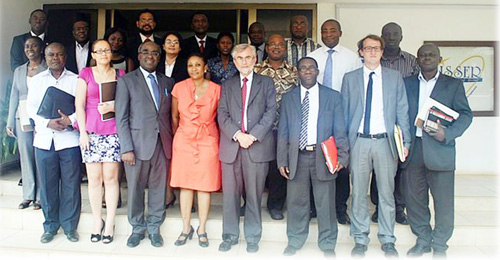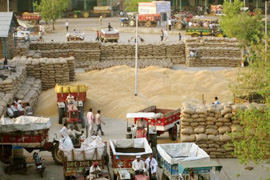An effort to bring competition reforms closer to citizens needs
Accra (Ghana), August 06, 2013
The theory and concept of competition is well known to economists, as explained in micro-economic theory. A state of ideal competition exists only in theory and not encountered in real life. It is important to realise that in reality competition is a dynamic process and not an ideal end-state as it is explained to be in theory. Such a notion of competition, removed from reality has resulted in development of a popular, but myopic view of the subject which is not informed by facts on the ground. These were some of the points highlighted by Frederic Jenny, Chair, OECD Competition Committee.
He went on to further suggest how competition was analogous to the force of gravity in the economic sphere. Just like ignorance of the force of gravity can lead to accidents, ignorance of the force of competition can unsettle the economy/markets.

Mr. Jenny was speaking at a meeting organised by ISSER (University of Ghana) as part of a project (CREW project, www.cuts-ccier.org/CREW), which they are implementing in Ghana in partnership with CUTS International. This initiative being supported by DFID (UK) and BMZ (Germany), facilitated by GIZ (Germany) is being implemented in four countries Ghana, India, The Philippines & Zambia by CUTS International in partnership with local organisations.
The event marked the first interaction of the project implementers with members of the National Reference Group (NRG) members. The NRG is a multi-stakeholder group of experts and practitioners comprising 15-20 members, constituted in each CREW project country. The NRG is designed to act as a platform for the project implementers (CUTS partners organisations, in each country) to seek views and guidance from these stakeholders on key aspects of the project. The purpose of the first NRG meeting was to orient the members of the project about its progress and discuss the methodology for undertaking research. Welcoming all members, Prof. Felix Asante, Director, ISSER observed that each member owns the project and should contribute to help taking the project forward to achieve its goal.
The project would gather evidence from the staple food and the passenger transport sectors in Ghana and assess how past and ongoing reforms (in these two sectors) have benefitted consumers and/or producers. It would also explore the possibility for future (potential) reforms and their usefulness in addressing consumer and producer concerns.. CUTS International has been implementing this project since November, 2012 over a period of three years in four countries: Ghana, India, The Philippines and Zambia.
Justice Samuel Kofi Date-Bah, Judge in the Supreme Court of Ghana stated that governments have responsibility towards providing and maintaining the legal infrastructure needed for private investors to make economic and trade-related decisions. He observed that the CREW project will provide empirical evidence that will enable governments to monitor and assess the adequacy of laws and policies on competition in these two key sectors.
Dr. Paulina Agyekum, sector expert on passenger transport, stated in her presentation that bus transport sector is dominated by several unions in Ghana. These unions seem to decide allocation of routes across private operators in Ghana (around Accra). She opined that it is easy for anybody to put a bus on a route in the intra-city market, as there are no entry barriers. She further mentioned that the bus sector has seen (over the years) a number of attempts to introduce pro-competitive market reforms, but the results were not forthcoming. It seems from anecdotal evidences provided by Dr. Agyekum that the government has not been able to manage the interaction between the state and the private sector in the bus transportation market in Ghana properly. Several cases were illustrated to support this view.
Dr. George Kwadzo, the sector expert on staple food presented a detailed view of the supply chain in the maize market. He explained that a number of new reform measures have been introduced like the Warehousing Receipt Systems (promoted under the auspices of the Ghana Grains Council). This initiative aims to integrate smallholders into the warehouse receipt system so they can benefit from direct linkages to more diversified markets. Ghanaian farmers have to usually sell their crops at harvest time, when the prices are low as demand for the grain is low. Further, a new fertiliser policy has been recently adopted by the government, to regulate the market and ensure availability of fertiliser for producers.
Emmanuel Tambi, Head Market and Trade, Forum for Agriculture Research in Africa (FARA) said that an investigation of the supply chain should start with assessing availability of farm inputs (fertiliser, seeds), credit, labour,, etc. Some of these issues are often more critical for the small scale farmers, who largely produce for own consumption.
Abrarham Zaato from National Road Safety Commission stated that safety is a major concern for the passengers. The structure of the buses used in passenger transport poses great danger to passenger safety if the vehicle meets with an accident. He advised that the sector (bus transport) be studied from three angles operational, passenger safety and vehicular condition.
In his concluding remarks, Rijit Sengupta, Director, CUTS International stated that the project aims to undertake evidence based advocacy. This project would aid in understanding the gains from competition reforms and use the outcomes for advocacy and generate awareness among various stakeholders. Given the focus on staple food (maize) and passenger transport (bus transport), this project would help bring competition reforms closer to the citizens of the country.
For more information, please contact:
Rijit Sengupta, +91 98292 85928 , rsg@cuts.org

What’s New
NOW-I Ghana
October 28, 2015
NOW-I Zambia
October 13, 2015
NOW-I India
October 10, 2015
NOW-I Philippines
September 24, 2015

